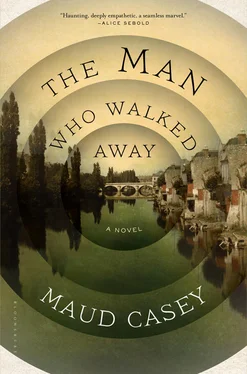When the great Léotard finally did whir past that day in his spectacular form-fitting outfit, the boy who did not yet dream of being a doctor, who dreamed only of being an acrobat in a spectacular form-fitting outfit, gripped the hands of his father and his mother. He was a boy of great imagination, according to his parents. “Sometimes too great,” his father said when he forgot to do this or that because he was dreaming of a life beyond their small town, one that didn’t involve his father’s dry goods store. He was so excited when the great Léotard rode by that he closed his eyes to imagine the man somersaulting over their heads, landing precisely, sublimely, in the seat of his magical machine. He imagined the great Léotard turning to him and saying: Come with me and we’ll somersault over thousands of heads . With his eyes shut tight, the only thing the boy experienced of the great Léotard and his magical machine that day was the whir of the wind on his face. But that glorious invitation! Be this great . It has stayed with him ever since, tugging him forward.
Today, the glorious invitation tugs the Doctor all the way to the City of Lights to a hospital altogether different from the simple vase of the asylum. This ward for insane women that was once a gunpowder factory and before that a poorhouse is complete with the first chemical laboratory, rooms for electrotherapy and hydrotherapy, a photographic laboratory, and a lecture hall that holds an audience of six hundred. The Doctor will soon be one of those six hundred, including doctors from Berlin and Vienna and as far afield as Riga, all come to see the great doctor discuss one of his cases as part of a lecture about the disorder that has condensed centuries of medicine.
“Hysteria,” the great doctor declared in a recent journal article, “will find its place in the sun.” The truth is it has already found its place. It has given a name to the young woman who collapses in fits, thrashing and grabbing at her throat as though she were being choked, and to the girl caught pleasuring herself in public, laughing uncontrollably though one side of her body has been struck with paralysis. It rolls along the new railway lines, its name whispered in café cars. At society parties, women play at having attacks — making faces, arms extended, rigid and strange, as if they were being crucified. A character in a recent novel even suffers from it.
Those doctors from Berlin and Vienna and Riga? After hearing the great doctor’s earlier lectures, they returned home to their own hospitals and now there were patients in Berlin and Vienna and Riga performing beautiful arcs de cercle and falling into exquisite paralysis. The Great Neurosis, as the great doctor sometimes calls it, is contagious. It is impossible to ignore, this disorder whose origin, the great doctor claims, may be traced to a physical defect of the nervous system, the result of an injury or of neuropathic heredity but whose manifestation is a mysterious alteration of unknown nature or location in the central nervous system. Ingenious: a lesion that is invisible! How could the Doctor ignore it?
The metal face of the train spews steam as it pulls in and out of stations. The light shines through the roofs of the stations, speckling the bodies of the bustling, pomaded men carrying suitcases and the perfumed women towing young children behind them. The Doctor watches as people walk out of the steam and then disappear back into it again. At the next station, a group of children run after the train as it pulls out, waving as it chugs away. “Wait for us!” they cry as if the train is something wondrous and magical, and it is. Progress is beautiful and the Doctor yearns to be part of it. The train makes its way north, connecting towns and villages not unlike the one where the Doctor lived with his parents — his parents who as children had drawn water from wells and lit their houses with tallow tapers, for whom sending a letter was a great luxury, who dreamed of Paris but never had the opportunity to visit. The train is an extraordinary vision they are all having together.
It pulls into the next station and the next and the next with a great puff and shhhh , as though relieved to have finally arrived at its destination. The exhalation of warm, wet steam rushes through the Doctor and then it is gone, replaced by the squeal of the brakes, so loud that at first he doesn’t hear the man speaking to him. He is startled to find someone sharing his compartment at all, never mind this vision in Scotch tweed, wearing a wide-brimmed felt hat, double-soled shoes, and gaiters.
“That’s a fine timepiece,” the red-cheeked man says again, pointing to the Doctor’s hand. His words rush out as though, finally, a great dam has broken.
It is only then the Doctor realizes he has been clutching his father’s watch. He returns it quickly to his pocket.
“The day of two noons,” the man says.
The Doctor nods, though he has no idea what the man is talking about. He looks out the window, hoping this will convey the enormity of his desire to be left alone. He had hoped to spend some of the train ride thinking through the case of Rachel, an asylum patient who believes she has a frog living in her stomach who demands she play the piano. Out the window, there is a field full of cows, a river full of fishermen casting lines from small boats, a forest full of trees, a thick, dark tangle. He closes his eyes, pretending to sleep.
“At midday, the clocks set back to coordinate the railroad schedules?” and the Doctor decides the man is not someone who might appear one day at the iron gates of his asylum after all, unless being boring were suddenly declared a pathology. He is just another person determined to give a lesson. “Twenty-four time zones? The day of two noons? The universal day was established, like the slicing of a pie.”
The Doctor opens his eyes, looking at the man in a way he hopes conveys exactly how little he wants to engage in this conversation.
“Owning such a fine timepiece, I assumed,” the man sniffs, “ incorrectly that you would be interested.” He riffles through his bag as though searching for something.
“Oh,” the Doctor says. “But of course I am.” He wants to be left alone, but he also doesn’t like other people’s sadness. He has been trained after all to fix it. Out the window, another dark tangle of trees, another open field.
“There has been talk, you know,” the man says, his cheeks glowing just a bit redder. It doesn’t take much to renew his hope. “People dying of apoplexy caused by the rapidity of these newer, faster trains. I don’t usually ride the train.” He pulls a little green book from his satchel and holds it up — evidence! “A Baedeker’s,” he says, as if the name isn’t right there on the front cover for the Doctor to read.
“Are you touring?” the Doctor asks, and the man smiles. There is a certain satisfaction in asking the right question.
“I am ,” says the man, as though he is saying, Finally . The Doctor sees in his eyes that the floodgates have opened and there is no closing them. “The roads are changing the world, my friend. If the whistle of the train engine is awakening us from slumber, then the road is a giant, wondrous hammer to the head!”
“That sounds painful.”
“For instance, the wonderful roads to Engstlenalp.”
“I have no doubt.” The Doctor knows nothing about the roads to Engstlenalp, but he has done his conversational duty and he does not feel obliged to ask.
“I’ve packed two sandwiches. Always travel prepared,” the man says. He offers the Doctor two thick slices of bread in between which is nestled a slab of mysterious meat.
The Doctor, though somewhat afraid of the mysterious meat, is ravenous. “Thank you.” In his rush to get out the door after his late night, he didn’t pack much food for the train ride, which, with his new traveling companion, threatens to last forever. The mystery meat sandwich turns out to be delicious despite, or maybe because of, its mysteriousness.
Читать дальше












